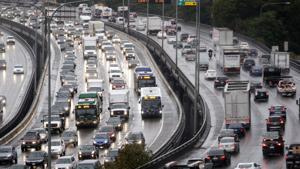Bill would plug electric vehicles into Washington’s proposed pay-per-mile road tax

(The Center Square) — The better mileage Washington drivers get out of their vehicles, the less money could be in state coffers for repairing roadways whose costs may outpace Washington’s steep gas tax.
Currently, drivers pay 49.4 cents per gallon at the pump in Washington — the fourth highest gas tax in the nation behind California, Illinois, and Pennsylvania. State lawmakers want to bump that tax higher as more fuel-efficient and electric vehicles hit the road and drivers fill up with less gas.
A bill sponsored by state Sen. Jake Fey, D-Tacoma, would raise Washington’s gas tax by 18 cents in 2022 to charging stations, electrify state ferries, and help fish culverts meet federal standards.
Gas taxes, which make up about 46% of Washington’s transportation budget, may fare even worse in the COVID-19 pandemic, which cut some $255 million in transportation revenue as more Washingtonians stayed home, the state Office of Financial Management estimates.
Senate Bill 5444, sponsored by Sen. Rebecca Saldaña, D-Seattle, would build on a proposal that’s been floated in the Washington Legislature for years — taxing drivers by the mile rather than by what they buy at the pump.
The concept has been taken up in several dozen states including Oregon, where in 2020, 600 volunteer drivers tracked their total mileage with an electronic plug-in device at the cost of 1.8 cents per mile.
The pilot program was similar to the year-long experiment in Washington where 2,000 drivers tracked their miles driven with GPS, odometer readings, or pay a fee up front.
“We have a way to collect revenue that is easy, cheap, and pollutes, and is declining,” Saldaña said. “I think what we’ve been struggling with for a while are what are some sustainable revenues that also advance the kind of policies that advance our economy and are good for Washingtonians.”
The bill would also replace the $225 registration fee people pay in Washington for electric vehicles and plug-in hybrids with a two cents per-mile road usage charge starting in July 2026, going up by half a cent in 2029.
Substituting the gas tax with road usage charges comes at the recommendation of the Washington State Transportation Commission, which recommended a phased adoption of road usage charges to include electric and hybrid cars. It also supported tying revenue from road usage charges to highway projects.
In July, the U.S. Department of Transportation awarded the Washington State Transportation Commission $5.5 million in federal grant money to research and test a road usage charge. Its work is slated for completion by 2023.
Getting gas guzzlers off the roads is part of Washington’s plan to reach net zero carbon emissions (CO2) by 2050 and cut the equivalent of 12.3 million cars off the road by 2030.
Transportation accounts for 45% of its CO2 emissions by the state Department of Ecology’s estimates, and Washington has pushed hard for electric vehicles with tax credits and promises of more charging stations.
Washington boasts the second largest batch of electric vehicles in the nation next to California, about 30,000, the U.S. Department of Energy reports.
Replacing the state gas tax with road usage charges, advocates say, would also be a key step towards a more progressive tax code and ease the burden for low-income drivers with older, less fuel-efficient vehicles.
The cash brought in by road usage charges will be needed more than ever, according to local officials testifying to the Transportation Committee Thursday.
In Issaquah, the city’s $800,000 in annual gas tax revenue is less than half the $2 million price tag of maintaining its 280 miles of pavement year by year.
“Theoretically, we could pave a road today and not have money to fund deferred maintenance for 70 years,” Issaquah Mayor Mary Lou Pauly said. “A road usage charge is a more equitable and sustainable long-term funding tool.”
Of the 41 people signed in to testify on the bill on Thursday, the minority who testified against it were opposed to bureaucracy and voiced digital privacy concerns. Others shared concerns that road usage charges could deter electric vehicle sales without more state incentives.
Washington Republicans have cast doubt on whether road usage charges could keep pace with collection costs.
“It doesn’t look like a real money maker,” said Sen. Curtis King, R-Yakima.
Transportation Committee chair Sen. Steve Hobbs, D-Lake Stevens, said the bill was still a work in progress, but a good first step in making a fairer tax system.
“Electric vehicles use the same roads as gas vehicles and those roads have wear and tear,” Hobbs said. “What we’re trying to do, as best we can, based on the data we have, is line up where an electric vehicle is paying as much for road maintenance as a gas vehicle, mile per mile. Right now it’s just a big giant fee and no one likes that.”
SB 5444 had four sponsors as of Friday including Hobbs, but it faces an uphill battle ahead of Monday night’s deadline for bills to make it out of committee. It has not been scheduled for executive action as of Friday afternoon.
Disclaimer: This content is distributed by The Center Square
